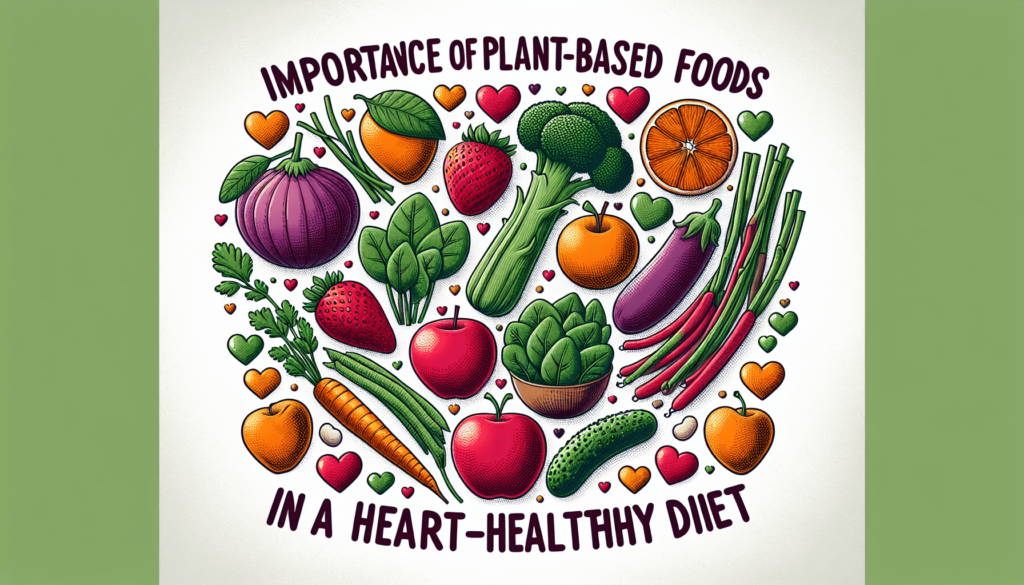What Makes A Diet Heart-Healthy?

Introduction
When it comes to maintaining heart health, your diet plays a vital role. But with countless dietary options out there, it can be challenging to navigate what truly makes a diet heart-healthy. In this article, we will explore the key components of a heart-healthy diet and provide you with practical tips to help you make healthier choices for your heart.
Understanding Heart Health
Your heart is a powerhouse that works tirelessly to pump blood throughout your body, supplying oxygen and nutrients to your organs and tissues. A healthy heart is essential for overall well-being and longevity. However, various factors such as poor diet, lack of physical activity, smoking, and stress can increase your risk of heart disease.
The Basics of a Heart-Healthy Diet
A heart-healthy diet focuses on eating a variety of nutrient-rich foods that promote cardiovascular health. By incorporating the following key elements into your daily meals, you can help lower your risk of heart disease and improve your overall well-being.
Fruits and Vegetables
Fruits and vegetables are rich in essential vitamins, minerals, antioxidants, and fiber that support heart health. Aim to fill half your plate with colorful fruits and vegetables at each meal to ensure you are getting a wide range of nutrients. Whether fresh, frozen, or canned, all forms of fruits and vegetables can contribute to a heart-healthy diet.
Whole Grains
Whole grains like brown rice, quinoa, whole-wheat bread, and oats are excellent sources of fiber, which can help lower cholesterol levels and improve heart health. Swap refined grains for whole grains whenever possible to increase your fiber intake and support a healthy heart.
Lean Protein
Incorporating lean sources of protein such as skinless poultry, fish, beans, legumes, and nuts into your diet can help reduce saturated fat intake and promote heart health. Fish high in omega-3 fatty acids, like salmon and tuna, are particularly beneficial for heart health.
Healthy Fats
While too much saturated and trans fats can raise cholesterol levels and increase the risk of heart disease, healthy fats like monounsaturated and polyunsaturated fats can have the opposite effect. Olive oil, avocado, nuts, and seeds are excellent sources of healthy fats that can support heart health when consumed in moderation.
The Role of Sodium in Heart Health
Excessive sodium intake has been linked to high blood pressure, which is a risk factor for heart disease. Reducing your sodium intake is crucial for maintaining a healthy heart. Here are some tips to help you lower your sodium consumption and protect your heart:
Limit Processed Foods
Many processed foods, such as canned soups, frozen meals, and packaged snacks, are high in sodium. Opt for fresh, whole foods whenever possible and cook meals from scratch to control the amount of salt you consume.
Use Herbs and Spices
Enhance the flavor of your dishes without adding extra salt by using herbs, spices, citrus juice, and vinegar. Experiment with different flavor combinations to create delicious meals that are low in sodium and full of heart-healthy ingredients.
Read Food Labels
Become familiar with reading food labels to identify hidden sources of sodium in packaged foods. Choose products with lower sodium content and be mindful of portion sizes to reduce your overall sodium intake.
The Importance of Hydration for Heart Health
Staying hydrated is crucial for heart health, as dehydration can lead to an increased heart rate and higher strain on the cardiovascular system. Drinking an adequate amount of water throughout the day can help maintain proper blood volume and support overall heart function.
How Much Water Should You Drink?
The recommended daily water intake varies depending on factors like age, weight, activity level, and climate. As a general guideline, aim to drink at least eight 8-ounce glasses of water per day, but adjust your intake based on your individual needs.
Tips for Staying Hydrated
Carry a reusable water bottle with you wherever you go to remind yourself to stay hydrated throughout the day. Set a timer on your phone or use a hydration tracking app to monitor your water intake and ensure you are meeting your daily hydration goals.
Hydrating Foods
In addition to drinking water, you can also increase your hydration levels by consuming foods with high water content. Fruits like watermelon, strawberries, and oranges, as well as vegetables like cucumbers and celery, can contribute to your overall fluid intake and support heart health.

The Benefits of Physical Activity for Heart Health
Regular physical activity is a cornerstone of a heart-healthy lifestyle. Exercise can help strengthen your heart, improve blood circulation, lower blood pressure, and manage weight, all of which are crucial for maintaining cardiovascular health. Here are some key benefits of physical activity for your heart:
Strengthening the Heart Muscle
Engaging in aerobic activities like walking, jogging, cycling, or swimming can help strengthen your heart muscle and improve its efficiency in pumping blood throughout your body. Regular exercise can also reduce the risk of heart disease and improve overall cardiovascular fitness.
Improving Blood Circulation
Physical activity increases blood flow to the heart and other organs, improving circulation and delivering essential nutrients and oxygen to your tissues. By enhancing blood circulation, exercise can help lower the risk of blood clots, heart attacks, and other cardiovascular conditions.
Lowering Blood Pressure
Regular exercise can help lower blood pressure by improving blood vessel function, reducing strain on the heart, and promoting relaxation. Managing blood pressure levels is essential for heart health and can help prevent complications like stroke, heart failure, and kidney disease.
Assessing Your Heart Health
Regularly monitoring your heart health can provide valuable insights into your overall cardiovascular well-being and help you make informed decisions about your diet and lifestyle habits. Here are some key metrics to consider when assessing your heart health:
Blood Pressure
Checking your blood pressure regularly is essential for monitoring your heart health. High blood pressure, or hypertension, is a major risk factor for heart disease and can lead to serious complications if left uncontrolled. Aim for a blood pressure reading of 120/80 mmHg or lower for optimal heart health.
Cholesterol Levels
Having healthy cholesterol levels is crucial for heart health. High levels of LDL (bad) cholesterol and low levels of HDL (good) cholesterol can increase the risk of heart disease. Get regular cholesterol screenings and work with your healthcare provider to manage your cholesterol levels effectively.
Blood Sugar Levels
Maintaining stable blood sugar levels is essential for heart health, as uncontrolled diabetes can lead to cardiovascular complications. Monitor your blood sugar levels regularly, especially if you have diabetes or are at risk of developing the condition, and follow your healthcare provider’s recommendations for managing your blood sugar.
Creating a Heart-Healthy Meal Plan
Planning and preparing heart-healthy meals can help you make better food choices, control portion sizes, and ensure you are getting the nutrients your heart needs to function optimally. Here are some tips for creating a heart-healthy meal plan:
Include Variety
Incorporate a variety of foods from different food groups to ensure you are getting a wide range of nutrients. Aim for colorful fruits and vegetables, whole grains, lean protein sources, and healthy fats in your meals to support heart health.
Watch Portion Sizes
Be mindful of portion sizes to avoid overeating and consuming excess calories. Use measuring cups, food scales, or visual cues like the palm of your hand to estimate appropriate portions and prevent overindulging.
Limit Added Sugars and Saturated Fats
Reduce your intake of foods high in added sugars and saturated fats, as they can contribute to heart disease. Be mindful of ingredients lists and nutrition labels to identify hidden sources of sugars and unhealthy fats in packaged foods.
Cook at Home
Preparing meals at home allows you to control the ingredients and cooking methods used in your dishes. Experiment with healthy recipes, try new cooking techniques, and involve your family in meal preparation to create a heart-healthy eating environment.
Tips for Dining Out Heart-Healthy
Eating out at restaurants or ordering takeout doesn’t have to derail your efforts to maintain a heart-healthy diet. By making smart choices and being mindful of your food and beverage selections, you can enjoy dining out while supporting your heart health.
Look for Healthier Options
Opt for dishes that are grilled, baked, steamed, or roasted instead of fried or breaded. Choose options with plenty of vegetables, lean proteins, whole grains, and healthy fats to create a balanced and nutritious meal.
Ask for Modifications
Don’t be afraid to ask for modifications to accommodate your dietary preferences and restrictions. Request dressings and sauces on the side, substitute unhealthy sides for steamed vegetables or a side salad, and choose water or unsweetened beverages over sugary drinks.
Share Large Portions
Many restaurants serve oversized portions that can lead to overeating and excess calorie consumption. Consider sharing a meal with a friend or family member, or ask for a to-go box to portion out half of your meal before you start eating.
Conclusion
Achieving and maintaining heart health requires a holistic approach that includes a balanced diet, regular physical activity, monitoring key health metrics, and making informed lifestyle choices. By incorporating the principles of a heart-healthy diet into your daily routine, staying hydrated, being physically active, and assessing your heart health regularly, you can support your cardiovascular well-being and enjoy a healthier, happier life. Remember, small changes can lead to significant improvements in your heart health over time. Start making positive choices for your heart today and reap the benefits for years to come.

